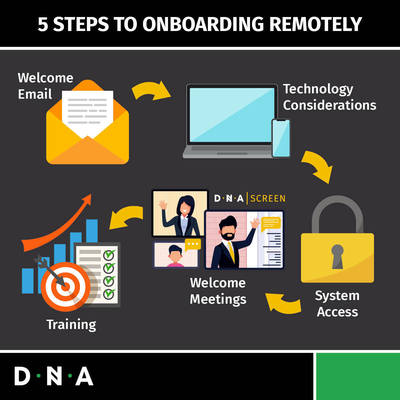
?1. The Welcome Email
This is probably the most vital, as it will contain the contact information of their manager, HR, team members and more. A personalised welcome message from the business owner is also a nice addition. It should include details of their first day and any other information they require.
2. Tech Considerations
There is nothing worse than not having the right equipment to carry out your work. So this is key and will be the first example your new employee will experience as to how you run your business. Have the equipment delivered to your new employee in plenty of time / ahead of their start date. Many companies are still offering online delivery and your IT company should be able to handle any set-up required. Just ensure you liaise with them and your new team member as they may need the user to install programmes which allow them access to the new machine. Many IT companies offer a service, for a small fee, where they complete a full set-up before dispatching to new employees, so be sure to ask as this may offer a better solution.
Make sure every detail is planned so you hit the ground running on day 1.
3. Access To Systems & Logins
The new team member will need a comprehensive list of all the platforms you use as a business. They will then need to have login details for all of these. You can set these up in advance so again they are ready from day 1. We would always recommend sending password information via encrypted messaging to be safe.
4. Welcome Meetings
HR is a must and should be one of the first meetings - they will need to collect key information, share any policies or procedures and run through the company onboarding process.
Remember you would normally walk someone round and introduce them, so this shouldn’t be any different whilst working remotely. Schedule a time to meet everyone – Zoom or Skype is a great way to do this, especially if you are part of a team as you can host group introductions.
Arrange meetings with their manager to discuss their role and expectations, work schedules and processes. Agree the work schedule and tasks for the week, explain how you expect them to report back or have procedures sign off, how to book and arrange weekly / daily meetings as needed and invite them to the team meetings. You want to ensure that as a manager, you share your company vision and values – share the team handbook and talk about the culture of the business, tell them why it’s great to be part of this company and ensure all your goals are aligned.
All of these meetings should be notarised and ANY agreed actions noted and emailed to all involved.
5. Training
With any new team member or system alike, there is a need for certain elements of training. Make a list of all the systems and compile all the ‘how to’, along with the phone number of a key user who they can call on if stuck! You may already have a training gospel which is great for any new starter but remember to always keep this updated – ask team members if they made notes on theirs as sometimes this can flag up any training gaps. A manager should run through all this information with the new starter to ensure they understand what procedures to follow in any event.
----------------------------------------------------------------------------------------------------------------------
I think the key thing at this time is to be honest and transparent – these are unprecedented times and new starters will appreciate the effort you make to ensure that they have the best possible introduction to the company. Hopefully these tips will be helpful to anyone onboarding remote workers, not just at this time but moving forwards to.